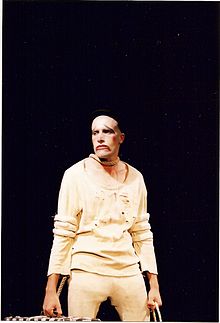Lucky (Waiting for Godot)

Lucky is a character from Samuel Beckett's Waiting for Godot. He is a slave to the character Pozzo.
Lucky is unique in a play where most of the characters talk incessantly: he only utters two sentences (one of which is more than seven hundred words long; see The monologue). Lucky suffers at the hands of Pozzo willingly and without hesitation. He is "tied" (a favourite theme in Godot) to Pozzo by a ridiculously long rope in the first act, and then a similarly ridiculous short rope in the second act. Both tie around his neck. When he is not serving Pozzo, he usually stands in one spot drooling or sleeping, if he stands there long enough. His props include a picnic basket, a coat, and a suitcase full of sand.
Interpretation
Lucky's place in Waiting for Godot has been heavily debated. Even his name is somewhat elusive. Some have marked him as "lucky" because he is "lucky in the context of the play": he does not have to search for things to occupy his time, which is a major pastime of the other characters. Pozzo tells him what to do, does it, and is therefore lucky because his actions are determined absolutely. Beckett asserted, however, that he is lucky because he has "no expectations". Another interpretation is (somewhat facetiously) that he is lucky because he has only two lines. In the French version of the play, he is known by the same name as he is in the English version, rather than the French word for "lucky", Chanceux.
Lucky and Vladimir
Lucky is often compared to Vladimir (just as Pozzo is compared to Estragon) as being the intellectual, left-brained part of his character duo (i.e. he represents one part of a larger, whole character, whose other half is represented by Pozzo). Read his way, Pozzo and Lucky are simply an extreme form of the relationship between Vladimir and Estragon (the hapless impulsive and the intellect who protects him). He philosophises, like Vladimir, and is integral to Pozzo's survival, especially in the second act. In the second act, Lucky becomes mute. Pozzo mourns this, despite the fact that it was he who silenced Lucky in the first act.
The monologue
Lucky is most famous for his speech in Act I. The monologue is prompted by Pozzo when the tramps ask him to make Lucky "think". He asks them to give him his hat: when Lucky wears his hat, he is capable of thinking. The monologue is long, rambling, and does not have any apparent end; it is only stopped when Vladimir takes the hat back. The text includes some sexual references and toilet humour, albeit subtly.
